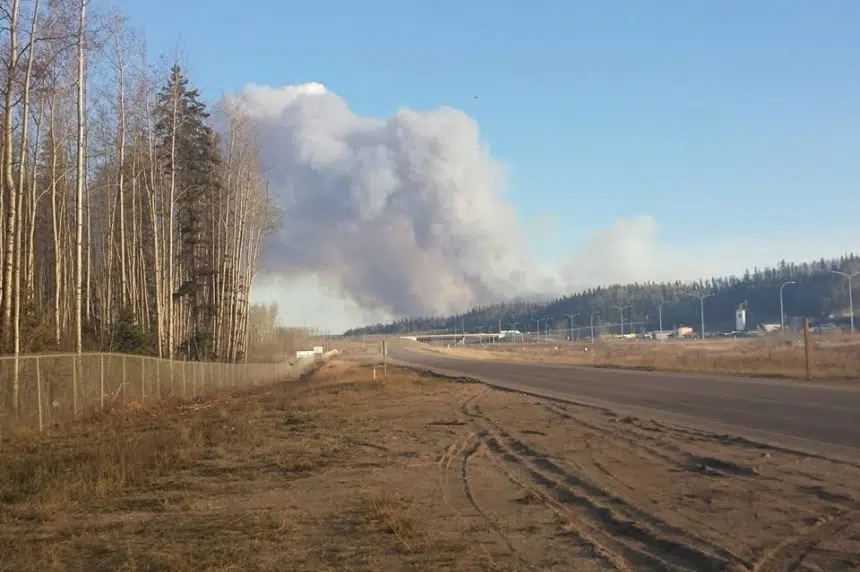The following radio essay is written by 650 CKOM reporter Chris Vandenbreekel, who worked as a news director in Fort McMurray during the 2016 wildfire.
Being a news reporter with 650 CKOM, I’m used to running towards some interesting situations.
But nothing will ever compare to the few days last year when I helped order evacuations of Fort McMurray as a news director and fled to camps north of the city.
Beacon Hill. Abasand. Waterways.
The neighbourhood names are seared into my brain, branded on by the accompanying visual of “The Beast.”
Outside on May 3, it looked like an evening when the sun was setting blood red. But it was the middle of the afternoon and there wasn’t any cloud cover.
Black smoke blotted out the sun, the flames reflecting back giving an eerie red glow as ash rained down everywhere.
It took everything I had to keep even a bit of composure, my heart breaking as I saw the reactions of my co-workers who had been in Fort McMurray for a lot longer than I had.
I came into the studio for an evacuation call and the host was crying, curled up in the corner waiting to hear whether her boyfriend and dog got out safe.
There’s only one road in and out of Fort McMurray, a four-lane highway that runs through town.
The Beast crossed the road, blocking the path south. Everyone had to go north, to oilsands camps.
The time came for us to leave the station. We didn’t want to go, but the fire was starting to come over the hill.
I brushed the ash off my Jeep like I would snow on a winter’s day. The temperature had gone up almost 10 degrees.
I had just enough gas to get to camp. I saw others who had run out, abandoning their cars and jumping in with strangers to get away.
The fire hit the phone and internet lines and we lost connection to our station.
Dead air.
When I got to camp, the parking lot was full. People lined up four-wide for half a kilometer, trying to get a room.
My wife and I crammed onto a cabin bed to try and rest. It didn’t last long.
My team set up a makeshift newsroom in a boardroom at an oilsands camp, keeping our web stories up-to-date and tweeting as much as possible. With no microphones or airwaves, it was all we could do.
I couldn’t sleep of course, and worked through the night.
I cried. A lot. More than I have in my life.
I’m thankful for the people I had around me. My co-workers were troopers, pushing through their own mental anguish to make sure the job got done.
My wife, usually the vulnerable one in our relationship, was a rock. She held it together to make sure I got through everything, made sure I kept functioning.
50 kilometres to the south was our motivation.
We could see a massive smoke plume rising, as if an atomic bomb had struck our city.
Day two in camp, there was a brief window to race south through the city. The fire was sleeping and fire crews had cleared a path.
But we couldn’t go. No fuel.
Shell was coming around and filling our tanks, but it was too late by the time they got to us.
So we worked.
It was day two we found out the fire turned to Stone Creek, toward the apartment building where we lived.
We were told the neighbourhood was gone.
It’s odd to say, but it brought a sense of relief. We were uncertain before, and the worry about what would happen was eating away at us.
But now we knew. We were starting over with just the two pairs of clothes we had with us and whatever we had left at our parents’ in Ontario.
It made things easier.
We worked away, tried and failed to sleep and worked some more.
WestJet started sending planes to the camp airports, hauling people out with their pets in the cabins free of charge to either Edmonton or Calgary.
We had reached the end of our usefulness. We headed to the airport and waited for 10 hours.
Finally on the plane to Calgary, then back to Ontario to show our parents we were okay.
It’s a bleak story but the ending is a bit better. We found out our apartment survived, the fire stopped 50 feet from the building.
Firefighters saved 90 per cent of the city, an effort described as “Herculean” by their chief and “heroic” by everyone else.
I’m still healing, even though I’m in Saskatoon now.
I have the support of family, both my own and my work family here at 650 CKOM.
It’ll take time to work through the PTSD. Fire trucks still get my heart rate up. There are days where I don’t function that well.
But in the words of the great Fort McMurray Fire Chief Darby Allen:
“We are here, we are strong.”







